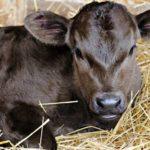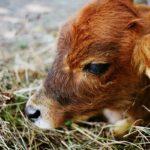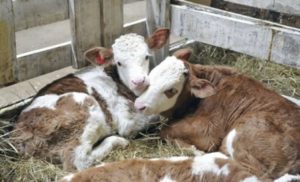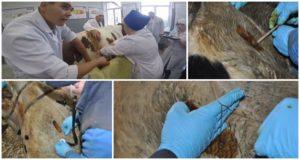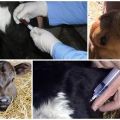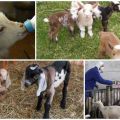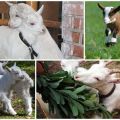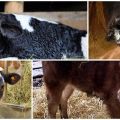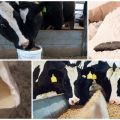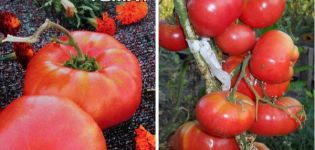Why do cows grind their teeth and what to do
In order for cattle breeding to be profitable, the owner should pay attention to the slightest changes in the behavior of the animals. They can inform a person about problems or serious illness that is beginning to occur. Understanding why a cow begins to grind her teeth, it is necessary to exclude diseases of the gastrointestinal tract, muscular dystrophy and some other factors.
Why does a cow grind its teeth
There are several reasons why an animal starts to grind its teeth. When using low-quality feed with sand, earth, garbage, there is a characteristic grinding. The lack of nutrition of vitamins and minerals makes the cows chew on the bedding, gnaw pieces of plaster in the barn. When feeding is normalized, the creaking of teeth disappears. However, if everything is normal with the nutrition and maintenance of animals, and the cow continues to grind her teeth, this can be a signal of the development of serious diseases.
If there is no gum
Cow chewing gum is an essential part of the digestive process. The animal swallows unchewed food, then returns it from the stomach in portions, moistens it abundantly with saliva and swallows it again, replacing it with another portion. Loss of gum means slowing down or completely stopping the digestion process, if you do not establish it as soon as possible, the cow will die. The reasons for the loss of gum can be different, the situation arises in the following cases:
- getting into the digestive tract of foreign objects (nail, wire, glass);
- eating poor quality feed;
- development of diseases (parakeratosis of the scar, gastroenteritis, pale muscle disease);
- complications after calving.
Milk-fed calves cannot have chewing gum; the process starts when the calves are transferred to adult feed.
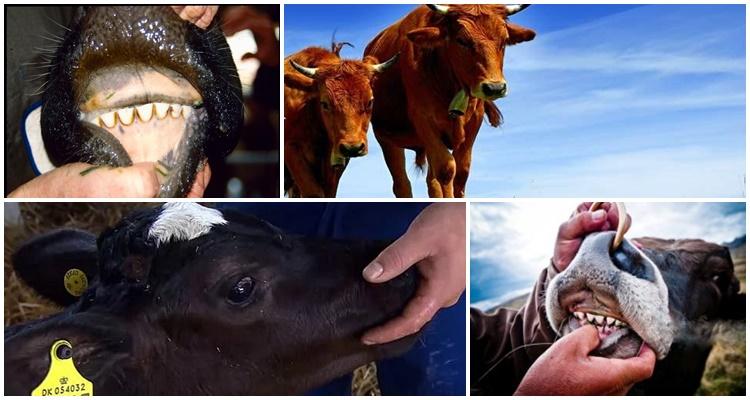
Scar parakeratosis
The disease is characterized by an increase and hardening of the papillae of the scar, which changes its microflora. Parakeratosis occurs in animals that eat finely ground food without sufficient roughage. It is noted in fattening animals and calves. In cows, appetite and motor function of the rumen decrease, teeth grinding, diarrhea with an admixture of blood occurs, and chewing gum is lost. Against the background of these signs, if untreated, dehydration, ulceration and scar necrosis develop.
If the animal's condition cannot be normalized in 1.5-2 weeks, it is discarded.
Gastroenteritis
A dangerous disease of the gastrointestinal tract in cows and calves, which is characterized by:
- diarrhea, bloating, painful colic;
- temperature increase;
- lethargy, lack of appetite, the animal lies a lot;
- teeth grinding;
- increased breathing, manifestations of cardiovascular failure.
The disease affects calves and adult livestock in violation of the conditions of detention, the use of poor-quality feed and dirty water for drinking, an unfavorable epidemiological situation in the area.
White muscle disease
It develops in calves of the first days of life. After calving, metabolic processes in the baby's body are disrupted. Vitamins and minerals cease to be absorbed, muscle atrophy is observed. The symptoms of the disease are:
- lethargic apathetic state;
- shortness of breath, heart palpitations;
- sharp stench of feces;
- the appearance of seizures;
- creak of teeth;
- temperature increase.
The calf lies, cannot stand on its legs, the animal is characterized by heavy labored breathing and gnashing of teeth. The cause of the development of white muscle disease is the increased sulfur content in the animal's body.

How to diagnose
The gum appears within an hour after eating. If the process of regurgitation of food is disturbed, the animal experiences pain, this can be understood by the following signs:
- the cow spreads its front legs wide;
- stretches the neck strongly;
- sags in the back, moans plaintively and grinds his teeth.
If the gnashing of teeth is caused by the ingress of earth or sand into the feed, there is no loss of appetite and no digestive problems. It is necessary to observe the animals, inspect and shake up the feed, clean the feeders. Soon the grinding of teeth disappears.
What do we have to do
If the animal begins to grind its teeth, loses its appetite and becomes lethargic, it should be isolated from the rest of the livestock. Close monitoring of the condition, examination of the feces and calling the veterinarian are the first things a responsible owner should do. The cow is watered abundantly with clean water and is not fed during the day.
When diagnosing scar parakeratosis, roughage is introduced into the diet, and the nutrition of the animal is normalized. Vitamin A and brewer's yeast (500 grams per liter of water) are prescribed, increased acidity is reduced by drinking a mixture of baking soda and burnt magnesia (a 4% solution is prepared) and 2-4 liters are given daily. Sick cows are injected with fluid from the rumen of healthy animals. With gastroenteritis, after receiving the test results and a daily fasting diet (with plenty of pure water), the stomach is washed by drinking a solution of baking soda to the animal.
Important: the cow should not be given any feed for a day.
After that, the doctor prescribes the use of antibiotics, a vitamin complex (A, B, E, C). To eliminate spasms, use "No-shpu". After the normalization of the state, they give rice or oatmeal water, watered with chamomile decoction. White muscle disease is treated in a complex way, with the use of sodium selenite, a complex of vitamins (E, B), methionine, drugs to support cardiac activity.
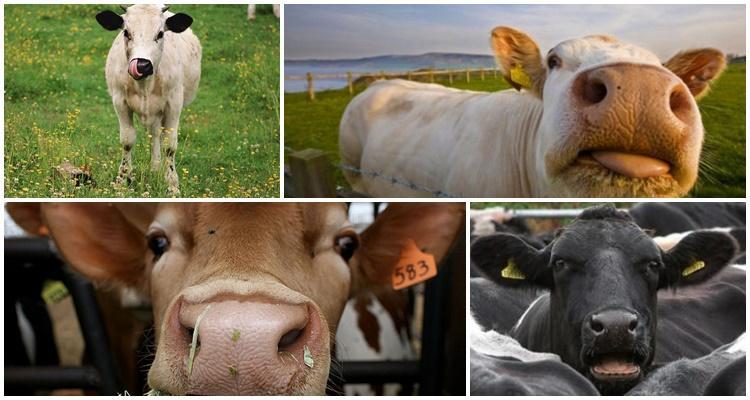
Problem prevention
It is possible to avoid diseases with a balanced diet of animals, adherence to the maintenance regime. Introducing vitamins and minerals into the diet reduces the likelihood of a problem.
Feeders and drinkers should be thoroughly washed using a hot 2% baking soda solution. Shake off feed, excluding the ingress of sand, earth, glass or wire. Give animals only clean water, do not use rotten, dirty, frozen vegetables for feeding. Clean the barn thoroughly (1-2 times a day).
Only high-quality feed is introduced into the diet of pregnant cows, they are given vitamins and minerals (salt, fish oil, bone meal, brewer's yeast), strictly on the recommendation of a veterinarian. Loss of gum is a signal of serious problems.Measures taken in time allow you to help the animal and maintain its health and productivity.
